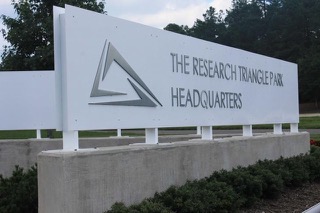by Anne Johnson
Platform offers insights on the forces that drive regional economies
Why do businesses spread like kudzu in some places but wither on the vine in others?
It’s an important question for anyone considering where to start a new business or seeking to cultivate a strong economy for their region. But it’s not an easy question to answer.
Maryann Feldman, PhD, has spent a career trying to understand how regional economies evolve. Feldman, who is the Heninger Distinguished Professor in the Department of Public Policy at UNC and Research Director at the UNC Kenan Institute of Private Enterprise, teamed up with RENCI to develop a database that brings new data and analysis capabilities to bear on this work.
The resulting tool, known as the PLatform for Advancing Community Entrepreneurship (PLACE), allows researchers, businesses, policy makers, and entrepreneurial support organizations to mine regional economic data for insights on the forces that drive entrepreneurship.
Geography still matters
In our highly connected world, it’s tempting to think physical location is irrelevant. But while technology certainly allows people to collaborate across distances, place still matters when it comes to cultivating economic growth.
“We are globally connected, but geography is still important because we are social beings,” Feldman explained. “In order to create new knowledge, to do innovative and creative activities, we need to engage with other people. It’s not simply a transaction of exchanging information, but about having a conversation and a relationship.”
With PLACE, researchers like Feldman can study the environmental factors that help cultivate those relationships. The platform amasses data on multiple facets relevant to economic activity within a prescribed geographic area and provides customizable reports that allow users to track trends.
Finding patterns in history
 The Research Triangle Park (RTP), an economic hub that was essentially created from scratch in the 1950s, provides a fruitful case study for examining regional transformation. As a test case for PLACE, the team populated the platform with decades worth of data on RTP gathered by the late William F. “Bill” Little, a former vice president of the UNC System, who had been involved with RTP since its early days.
The Research Triangle Park (RTP), an economic hub that was essentially created from scratch in the 1950s, provides a fruitful case study for examining regional transformation. As a test case for PLACE, the team populated the platform with decades worth of data on RTP gathered by the late William F. “Bill” Little, a former vice president of the UNC System, who had been involved with RTP since its early days.
“To best understand how economic growth is generated, how places change, how new industries emerge, we need a long time series,” said Feldman. “We’re now able to really do a deep dive on the RTP region. We have a chance to look at the development of this regional economy over a 60-year time period.”
The RTP database supported by PLACE includes details on company founders, employees and business activities of 4,200 technology-intensive entrepreneurial firms in the 13 counties surrounding RTP. Feldman and her colleagues have already published several academic papers based on this data, exploring topics such as social capital, resilience and change over time.
Flexibility for the future
Developed with funding from the National Science Foundation, the platform was created with a wide variety of users and uses in mind—and the stipulation that it will be shared freely.
“The biggest challenge was to understand all of the needs and flexibilities that I would need to address in how the system was designed,” said RENCI software developer Oleg Kapeljushnik, who created the platform’s technological backbone. “The flexibility of the reporting capabilities is a real strength. The desire to make it flexible sometimes required going the extra mile to foresee how user needs might change and adapt to those changes.”
That built-in flexibility is already paying off. After hearing about PLACE at a conference, economic development practitioners in Chattanooga, TN asked how they might be able to use it to inform their regional development decisions. Kapeljushnik worked with the team to adapt PLACE for Chattanooga’s data, giving the region’s practitioners a valuable new tool to explore economic transformations in their area. The PLACE team is now in talks with partners in Boulder, CO for a similar deployment.


